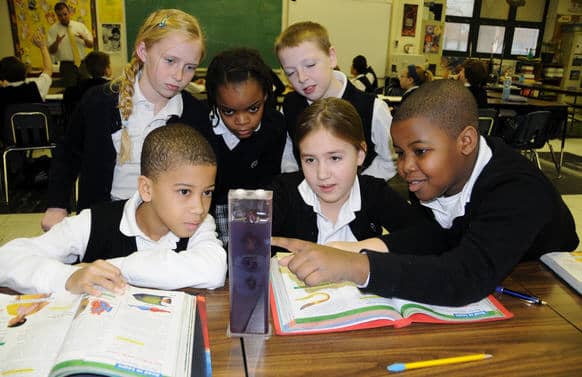As parents it’s hard to keep up with our kids’ learning schedules. By now, we have got the hang of school, but most parents still don’t really know what their kids are meant to know by the end of each grade. When are they supposed to know their math facts? By what age should they be able to read fluently and completely comprehend stories and passages? Are they on track with their grade-level learning or do we need to help them catch up?
These are all questions we cover in our series on what kids learn in each grade. Today, we’re moving onto grade 4.

Some Background
Grade 4 is when the big switch happens. Your kids will now be reading to learn, rather than learning to read. They’ll be taking on bigger projects that will need planning, more detailed work and presentation. Each subject will have its own textbook and students will be expected to keep their books and folders organized for all subjects. They’ll be working in groups and more independently, expected to keep track of their assignments, classwork and homework.
Reading
Reading gets more sophisticated in grade 4. Your kids will be working on building their vocabulary, beginning to look at word roots, suffixes and prefixes. They will also be reading a greater range of genres, such as folk tales and fables, myths and legends, and all kinds of non-fiction materials, including encyclopedias, newspapers and magazines.
Writing
Your fourth grader will delve into research to gather information on topics they are writing about. Through the use of dictionaries, encyclopedias and the Internet, your child will be expected to organize information into paragraphs, essays and presentations in a logical manner. They’ll be expected to review and edit their work before handing it in.
In creative writing, students will learn how to develop their personal voice and writing style. They will learn about proper punctuation, quotation marks and dialogue in stories.
Math
In math, students will build on the number sense and patters learned in grade 3, to learn how to use those patters to find factors and multiples of numbers, to convert and calculate units of measure and to work with fractions. They will learn about prime numbers and explore geometry formulas for determining perimeter and area, and measure angles. Students will work on conversion problems and will learn to read and create graphs, tables and charts.
Science
In science, fourth graders will be observing the interactions between organisms and their environment, learn about the water cycle and look at changes in the Earth over long periods of time. They’ll be working on projects that will ask them to build hypotheses and make predictions. Topics they’ll explore may include matter in its different states, the solar system, motion of objects, electricity and circuits, and forms of energy.
Social Studies
In grade 4, your kids will move from learning about the local community to the history of their home state. Often this learning will involve a field trip or even an over-night trip to a historic location or museum in your state. Students will learn about the first people that lived in this area, explore the changes in population over time and how different people from different cultures have immigrated, and adapted, to living in their state. Kids will also be introduced to local and state government and their laws.

